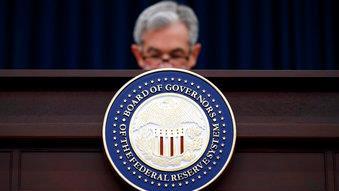Ford, Walmart vs. Fed: Trump tariff debate
Corporate America – including companies like Ford and Walmart – has been sounding the alarm on the president’s tariff policies, but Federal Reserve Chairman Jerome Powell said those warnings may be premature.
During a press conference following the two-day FOMC meeting on Wednesday, Powell said, “We don't really see effects that we can measure yet,” in regards to the president’s trade policies.
“I think if you look at the aggregate -- the performance of the U.S. economy at an aggregate, at a national level, it's hard to see much happening at this point,” Powell added.
During a press conference in New York on Wednesday night, President Trump reiterated those sentiments while discussing relations with key U.S. trade partners.
“It's had no impact on our -- absolutely, by the way, no impact on our economy, which I said it wouldn't. In fact, steel is like the hottest industry there is,” he said.
Big businesses in the U.S., however, have a very different take on the effects of the administration’s trade policies.
Earlier on Wednesday, Ford CEO James Hackett said the steel and aluminum tariffs have cost his company about $1 billion in profits, as reported by Reuters, adding that if the policy continues “it will do more damage.”
Walmart, one of the country’s largest retailers, wrote in a letter earlier this month to U.S. Trade Representative Robert Lighthizer that the new tariffs could result in higher consumer prices at its stores. The company said prices for items ranging from food to car seats to luggage to gas grills and Christmas lights, could increase in price by anywhere between 10 percent to 25 percent.
Many other companies have sounded similar warnings, including Procter & Gamble and Macy’s.
Powell said that the concerns he has regarding the tariff policy, which have not yet been realized, are a loss of business confidence and a reaction in the financial markets. He also voiced concerns about the tariffs remaining in place for an extended period of time.
“More than anything, though, I would worry in the longer run where this is going,” he said. “I think if this, perhaps inadvertently, goes to a place where we have widespread tariffs that remain in place for a long time, a more protectionist world, that's going to be bad for the United States' economy, and for American workers and families, and also for other economies.”
The Trump administration recently implemented another round of tariffs on $200 billion worth of goods from China. Beijing implemented countermeasures on $60 billion worth of U.S. exports. In response, Chinese officials reportedly canceled the next round of trade negotiations, and said Trump was employing bullying tactics to bend trading partners into submission.




















